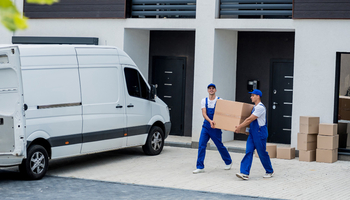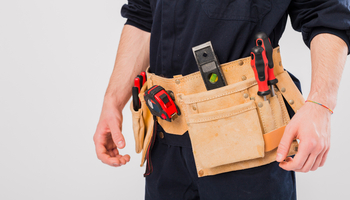6 bewährte Methoden zur Optimierung der B2B-Logistik

Eine reibungslose B2B-Logistik ist das Rückgrat jedes erfolgreichen Unternehmens. Ohne eine starke Logistik und Transport erreichen selbst die besten Produkte die Kunden nicht rechtzeitig. Die gute Nachricht ist, dass moderne Tools und Strategien Kosten senken, Fehler reduzieren und den Versand nahtlos gestalten können. Moovick gestaltet die B2B-Logistik neu, um kleinen und mittleren Unternehmen in Deutschland und den Niederlanden dabei zu helfen, ihre Vertriebsnetze zu optimieren. Deshalb stellen wir dir sechs bewährte Methoden vor, mit denen du die Lieferung und Kontrolle vereinfachen und so die steigende Nachfrage im Logistikbereich bewältigen kannst.
Was ist B2B-Logistik?
B2B-Logistik bezieht sich auf den Transport von Waren zwischen Unternehmen und nicht direkt zu Verbrauchern. Sie umfasst Transportlogistik, Lagerung, Verpackung und Lieferdienste, die deine Lieferanten, Hersteller und Händler miteinander verbinden.
Wenn zum Beispiel ein Möbelhersteller Rohholz von einem Lieferanten bezieht und später fertige Stühle an einen Einzelhändler liefert, ist das B2B-Versand. Im Gegensatz zu B2C-Transaktionen geht es bei B2B-Transaktionen um große Mengen, mehrere Schritte und oft um maßgeschneiderte Logistik- und Managementsysteme.
Wenn du nach B2B-Lösungen in deiner Nähe suchst, bieten Unternehmen wie Moovick Logistics As A Service (LAAS) an, um diese Abläufe zu vereinfachen und einen schnellen, kostengünstigen Versand zu ermöglichen.
Die Bedeutung der Rationalisierung der B2B-Logistik
Wenn Unternehmen ihre Logistik und ihr Management optimieren, sparen sie Geld, steigern die Kundenzufriedenheit und reduzieren Lieferverzögerungen. Effektive Logistikprozesse sorgen dafür, dass Produkte pünktlich ankommen, die Kosten vorhersehbar bleiben und sich die Beziehungen zu Partnern verbessern.
Unternehmen, die intelligentere Systeme und Automatisierung einsetzen, erzielen bis zu 25 % Einsparungen bei den Liefer- und Lagerkosten. Unternehmen können außerdem ihre Gewinne sichern, ihre Flügel ausbreiten und aufatmen, da sie wissen, dass jeder Artikel pünktlich und in dem Zustand, in dem er versandt wurde, sein Ziel erreicht.
Herausforderungen der B2B-Logistik
Selbst bei guter Planung stehen B2B-Logistikdienstleistungen vor Hindernissen. Hier sind die häufigsten:
- Komplexität
Der Massentransport erfordert die Koordination zwischen mehreren Anbietern, Lagern und Routen. Kleinere Fehler können zu erheblichen Rückschlägen führen.
- Geopolitische Konflikte
Globale Lieferketten leiden, wenn Grenzen verschärft werden oder sich die Handelspolitik ändert. Die Kosten steigen und die Waren brauchen länger, bis sie ankommen.
- Arbeitskräftemangel
In der Logistikbranche gibt es einen Mangel an qualifizierten Arbeitskräften, von Lkw-Fahrern bis hin zu Lagerpersonal. Dies führt zu Lücken im Service.
- Engpässe und Verzögerungen
Überfüllte Häfen, viel Verkehr oder plötzlich hoher Bedarf machen die Transportlogistik langsamer. Verspätete Lieferungen nerven die Kunden.
- Höhere Produktionskosten
Steigende Kraftstoffpreise, Lagergebühren und zusätzlicher Papierkram treiben die Kosten in die Höhe. Unternehmen müssen am Ende mehr bezahlen, nur damit die Waren weiter transportiert werden.

Bewährte Methoden zur Optimierung der B2B-Logistik
Die richtigen Strategien können deine Logistikabläufe total verändern. Hier sind sechs bewährte Methoden:
1. Schau dir deine aktuelle Situation an
Wenn du deine aktuelle Situation überprüfst, ist es auch hilfreich, dir anzuschauen, wie Daten durch dein System fließen. Du kannst checken, ob du immer noch auf manuelle Updates oder veraltete Software angewiesen bist. Diese kleinen Lücken führen oft zu größeren Verzögerungen im weiteren Verlauf. Indem du verfolgst, wo Informationen verloren gehen oder verlangsamt werden, kannst du genau erkennen, welche Bereiche dein Team behindern. Auf diese Weise basieren Verbesserungen auf Fakten und nicht auf Vermutungen, wodurch jede Änderung effektiver und leichter messbar wird.
2. Schätze dein Produktionsvolumen ein
Passe deine Produktionsgröße an die B2B-Logistikdienstleistungen an. Für Massensendungen brauchst du größere Lagerhäuser und andere Versandoptionen als für kleinere Mengen.
Wenn du dir Zeit nimmst, um das Produktionsvolumen zu überprüfen, hilft das auch bei der Nachfrageprognose. Wenn du weißt, wie schnell Waren produziert und versandt werden, ist es einfacher, die richtigen Partner auszuwählen, Engpässe bei der Lagerung zu vermeiden und Hochsaisonen ohne Stress in letzter Minute zu planen.
Tipp für die Abstimmung der Produktion auf die logistischen Anforderungen:
| Produktionsvolumen Empfohlene | Logistikkonfiguration |
| Kleine Chargen | Kurierdienst + kleines Lager |
| Mittlere Mengen | Regionales Lager + Lieferung über mehrere Routen |
|
Großes Maß |
Fortschrittliche Automatisierung + globale Transportlogistik |
3. Implementiere ein Online-Bestellsystem
Digitale Plattformen erleichtern es Kunden, Großbestellungen aufzugeben, Sendungen zu verfolgen und den Papierkram zu reduzieren. Außerdem sorgen sie für Genauigkeit in der Logistik und Verwaltung.
Mit einem Online-System kannst du alles an einem Ort verwalten, von der Auftragserteilung bis zu Lieferaktualisierungen. Das verringert das Risiko von Missverständnissen, da alle Details in Echtzeit gespeichert und geteilt werden. Deine Kunden müssen nicht mehr mehrere E-Mails senden oder Anrufe tätigen, um Bestellungen zu bestätigen.
Außerdem wird dadurch die Geschwindigkeit verbessert. Anstatt auf manuelle Genehmigungen zu warten, werden Bestellungen sofort über das System bearbeitet, was sowohl Käufern als auch Lieferanten Zeit spart. Für B2B-Geschäfte kann das schnellere Durchlaufzeiten, weniger Verzögerungen und zufriedenere Kunden bedeuten.
Ein weiterer wichtiger Vorteil ist die Datentransparenz. Jede Bestellung hinterlässt einen digitalen Fußabdruck, wodurch es einfacher wird, vergangene Transaktionen zu überprüfen, Trends zu erkennen und die zukünftige Nachfrage zu prognostizieren. Das hilft deinem Unternehmen, besser zu planen, den Lagerbestand zu kontrollieren und Überbestände oder Engpässe zu vermeiden.
4. Setzen Sie auf Technologie und Automatisierung
Nutzen Sie Tracking-Tools, Bestandssoftware und KI-gesteuerte Plattformen, um Logistik und Transport zu beschleunigen. Automatisierung minimiert menschliche Fehler und spart Zeit.
Wenn Fertigungs- und Industriezulieferer auf Automatisierung setzen, laufen die täglichen Abläufe reibungsloser. Beispielsweise sorgen Barcode-Scans und automatische Bestandsaktualisierungen dafür, dass die Bestandszahlen immer korrekt sind. Dies verringert das Risiko, dass Produkte ausverkauft sind oder überschüssige Artikel Lagerplatz und Geld binden.
Tracking-Tools sorgen außerdem für mehr Sicherheit. Dank Echtzeit-Transparenz wissen Unternehmen in jeder Phase der Lieferung, wo sich ihre Waren befinden. Dies hilft nicht nur bei der schnelleren Entscheidungsfindung, sondern verbessert auch die Kommunikation mit Kunden, die ihre Bestellungen verfolgen können, ohne auf Updates warten zu müssen.
KI-gesteuerte Plattformen sorgen für zusätzliche Effizienz. Sie können die Nachfrage vorhersagen, optimale Lieferrouten vorschlagen und sogar potenzielle Verzögerungen prognostizieren, bevor sie eintreten. So können Unternehmen schnell reagieren und kostspielige Unterbrechungen vermeiden.
5. Verbessere deine Preisstrategie
Passe deine Logistikkosten an deine Lieferversprechen an. Mit wettbewerbsfähigen Preisen sind deine Kunden zufrieden und du kannst deine Kosten decken.
Eine kluge Preisstrategie fängt damit an, dass du deine tatsächlichen Kosten kennst. Das heißt, du musst nicht nur Kraftstoff und Transport, sondern auch Arbeit, Lagerung, Verpackung und sogar die von dir verwendeten technischen Hilfsmittel im Blick behalten. Wenn alle Details stimmen, ist es einfacher, Preise festzulegen, die sowohl für deine Kunden fair als auch für dein Unternehmen nachhaltig sind.

Transparenz ist auch super wichtig. Deine Kunden werden es schätzen, wenn sie genau wissen, wofür sie bezahlen, ohne versteckte Kosten. Eine klare Preisgestaltung schafft Vertrauen und sorgt oft für Folgeaufträge, weil die Kunden von dem Wert deiner Leistungen überzeugt sind.
Eine weitere bewährte Methode ist die Verwendung flexibler Preismodelle. Zum Beispiel kannst du mit gestaffelten Preisen für Großaufträge oder Treuerabatten deine Dienstleistungen attraktiver machen, ohne deinen Gewinn zu schmälern. Diese Balance ermöglicht es dir, wettbewerbsfähig zu bleiben und gleichzeitig deine Margen zu schützen.
6. Bessere Zusammenarbeit mit Logistikdienstleistern (LSPs)
Teile deine Ziele klar mit und analysiere regelmäßig, wie deine Logistikpartner sich dafür einsetzen, ihren Teil dazu beizutragen. Stell sicher, dass eure Interessen übereinstimmen, denn wenn ihr auf dasselbe Ziel hinarbeitet, sind alle Ziele sicherer.
Durch den Aufbau starker Kommunikationskanäle können beide Seiten auf dem Laufenden bleiben und Probleme schnell angehen. Konzentriere dich darauf, ein angenehmes Umfeld des gegenseitigen Verständnisses und der Teamarbeit zu schaffen, das Ideen zur Problemlösung fördert.
In der heutigen Welt, in der Logistikunternehmen als ein Rad im Lieferfahrzeug eines Unternehmens fungieren, braucht ein Unternehmen möglicherweise mehr als eines, um das Gleichgewicht zu halten und das System reibungslos am Laufen zu halten.
Was ist ein Logistikunternehmen?
Ein Logistikunternehmen ist ein Dienstleister, der den Warenfluss von einem Ort zum anderen verwaltet. Ein Logistikunternehmen sorgt dafür, dass Produkte sicher vom Lieferanten zum Unternehmen oder vom Unternehmen zum Einzelhändler gelangen.
Sie können Folgendes verwalten:
- Lagerhaltung
- Bestandsverwaltung Transportlogistik
- Auftragsabwicklung
- Last-Mile-Lieferung
Third-Party-Logistics-Partner (3PL) können teilweise oder vollständig an der Durchführung von Transport und Lieferung zwischen zwei Unternehmen oder deren Kunden beteiligt sein. Sie bieten eine flexiblere Option als ein traditioneller Spediteur. Die B2B-Logistik- und Managementlösungen von Moovick bieten maßgeschneiderte Dienstleistungen, von der Fracht bis zur Last-Mile-Lieferung.
Moovick Smart Moving and Logistics-Lösung
Moovick ist mehr als nur eine Umzugsplattform und hat sich zu einem umfassenden B2B-Logistikdienstleistungspartner für kleine und mittlere Unternehmen entwickelt.
Ein wachsendes Unternehmen zu führen ist nicht einfach, vor allem wenn die Logistik zu einer täglichen Herausforderung wird. Von Zeitverschwendung bis hin zu unzuverlässigen Dienstleistungen – diese Herausforderungen bremsen oft das Wachstum. Hier kommt Moovick ins Spiel und bietet innovative Lösungen, die Transport und Lieferung einfach, schnell und auf die spezifischen Bedürfnisse zugeschnitten machen.
Viele Unternehmen verbringen Stunden damit, sich mit Fahrern abzustimmen, endlose Telefonate zu führen oder über Kosten zu verhandeln. Moovick beseitigt all diesen Stress durch sofortige Buchung und Automatisierung, die über die App verfügbar sind. Mit nur wenigen Klicks wird der Transport für die Lieferung am selben oder am nächsten Tag ohne Verzögerungen und ohne Hin und Her organisiert.
Fahrer mit Transporter buchen
Unzuverlässige Anbieter können echt nervig sein und zu versäumten Lieferungen und unzufriedenen Kunden führen. Moovick löst dieses Problem, indem es nur mit vertrauenswürdigen und geprüften Transportunternehmen zusammenarbeitet und so einen pünktlichen und zuverlässigen Service gewährleistet. Egal, ob es sich um einen kleinen Transporter oder einen großen Lkw handelt, Unternehmen können jederzeit eine sofortige Abholung buchen und bleiben immer auf dem Laufenden. Anstelle von starren Preisen bieten wir transparente und individuelle Tarife, bei denen Unternehmen nur für das bezahlen, was sie tatsächlich nutzen – ohne Überraschungen und ohne zusätzliche Kosten.
Bist du bereit für deine nächste Lieferung und möchtest, dass alles reibungslos klappt? Dann fang hier an.
FAQ

1. Warum ist es wichtig, die B2B-Logistik zu optimieren?
Es senkt die Kosten, verbessert die Liefergeschwindigkeit und sorgt für einen reibungsloseren Ablauf der Lieferkette.
2. Wie hilft Moovick kleinen Unternehmen?
Moovick bietet schnelle, App-basierte B2B-Logistikdienste mit Lieferung am selben Tag und Kosteneinsparungen von bis zu 25 %.
3. Wer kann Moovick B2B in meiner Nähe nutzen?
Moovick bietet flexible B2B-Versandlösungen für KMU, unter anderem in folgenden Bereichen:
- Fertigung und Industriezulieferer
- Bauwesen und Baumaterialien
- Veranstaltungs- und Messedienstleistungen
- Großhandel und Vertrieb
- Einzelhandel und E-Commerce
- Lebensmittel- und Getränkeindustrie
4. Kann ich meine Sendungen mit Moovick in Echtzeit verfolgen?
Klar. Mit der Live-Tracking-Funktion von Moovick weißt du immer, wo deine Waren gerade sind.
5. Welche Arten von Fahrzeugen kann ich bei Moovick buchen?
Von kleinen Transportern bis hin zu großen Lkw – Moovick findet sofort das richtige Fahrzeug für deine Lieferanforderungen.
Beliebte Artikel

Die größten Herausforderungen beim Umzug aus Deutschland ins Ausl...

Vorteile der Beauftragung lokaler Umzugsunternehmen für deinen nä...

Die 5 wichtigsten Gründe, warum du einen Handwerker für die Einri...

5 Dinge, von denen du nicht wusstest, dass du Crowdshipping nutzen ...

Wie du dein Budget für die Renovierung deines Hauses festlegst und...

Umzug nach Europa: Ein Leitfaden für indische Auswanderer

